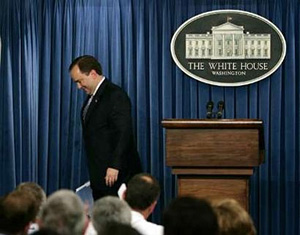 |
 |
 |
 Travel Writers' Resources | May 2006 Travel Writers' Resources | May 2006  
The Fox News Effect
 Richard Morin - Washington Post Richard Morin - Washington Post


| | White House Press Secretary Scott McClellan steps away from the podium for the last time after conducting his final daily briefing in the Brady Press Briefing Room of the White House in Washington May 5, 2006. McClellan will be replaced by former Fox News radio host Tony Snow. (Reuters/Jason Reed) |
We report. You decide. Does President Bush owe his controversial win in 2000 to Fox cable television news?

Yes, suggest data collected by two economists who found that the growth of the Fox cable news network in the late 1990s may have significantly boosted the Republican Party's share of the vote in the 2000 election and delivered Florida to Bush.

"Our estimates imply that Fox News convinced 3 to 8 percent of its audience to shift its voting behavior towards the Republican Party, a sizable media persuasion effect," said Stefano DellaVigna of the University of California at Berkely and Ethan Kaplan of Stockholm University.

In Florida alone, they estimate, the Fox effect may have produced more than 10,000 additional votes for Bush - clearly a decisive factor in a state he carried by fewer than 600 votes.

Fox cable news debuted in 1996 as a competitor to CNN and four years later was available to about one in five Americans. That allowed DellaVigna and Kaplan to compare changes in the Republican vote shar efrom 1996 to 2000 in 9,256 cities and towns where Fox News was introduced. They also examined election cdata from 2004.

The Experiment: The Fox Effect II

We experiment. You decide: Do people apply a political litmus test to the news?

Yes, suggest the results of the latest online experiment by The Washington Post, washingtonpost.com and Stanford University's political communication lab.

The test found Republicans preferred to get their news from Fox - even when the news stories were about subjects far removed from politics, such as sports or travel.

On the other hand, Democrats avoided Fox when it came to political news and preferred National Public Radio and CNN. And when the news focused on controversial issues such as the Iraq war and politics, "partisans are especially likely to screen out sources they consider opposed to their political views," said Stanford professor Shanto Iyengar, director of the communication lab.

More than 2,000 people participated in the test of whether attention to the identical news story was increased or decreased when the story was attributed to Fox News, NPR, CNN or the BBC. Participants saw a brief headline accompanied by the logo of the news organization. They were asked to choose which story they wanted to see, then repeated the task across six news categories - American politics, the war in Iraq, race in America, crime, travel and sports.

There was one twist: Some participants saw a story attributed to Fox, whereas others saw the same story attributed to CNN, NPR or the BBC. Comparing the percentage of Democrats who chose to see a story about race if it was on Fox vs. CNN offered clues about whether partisanship mattered.

The results found strong evidence that people apply a political litmus test to the news, avoiding sources they view as unfriendly while seeking out compatible sources, a finding confirmed by researchers at Polimetrix in a national study with a representative sample of adults done in cooperation with the Stanford lab.

The Republicans even preferred to get news about sports and travel from Fox while Democrats didn't have as strong a preference on non-political stories, Iyengar found.

A complete analysis of the results of the latest Post-Stanford experiment can be found at www.washingtonpost.com. | 
 | |
 |



